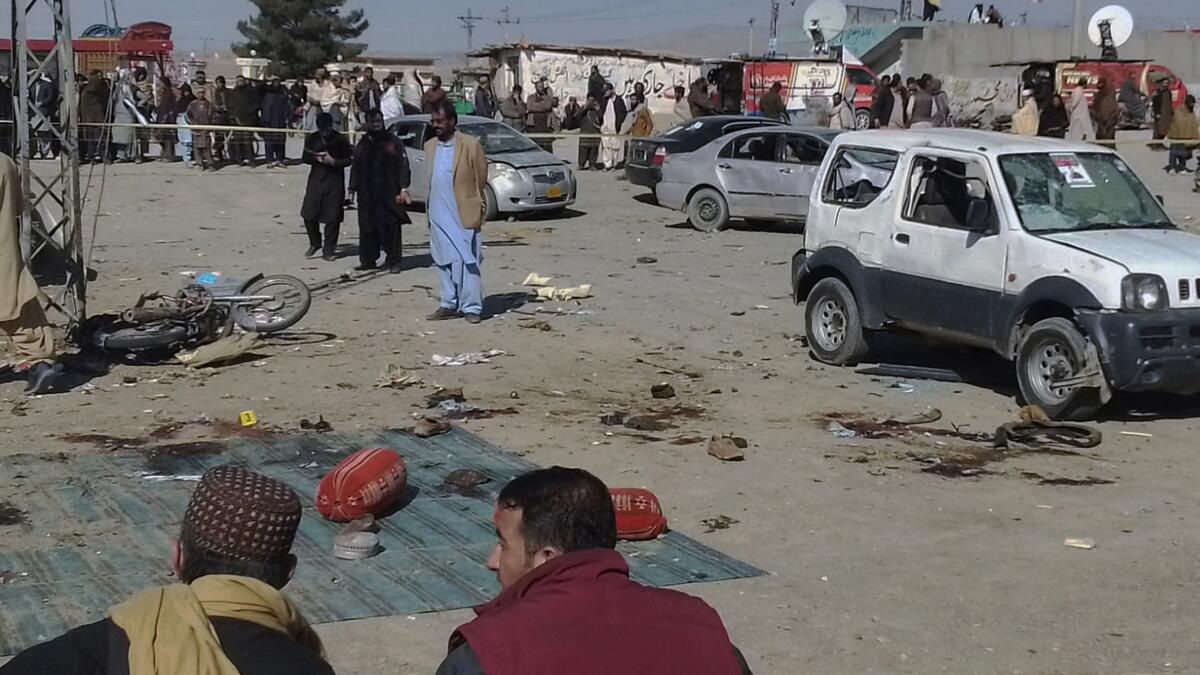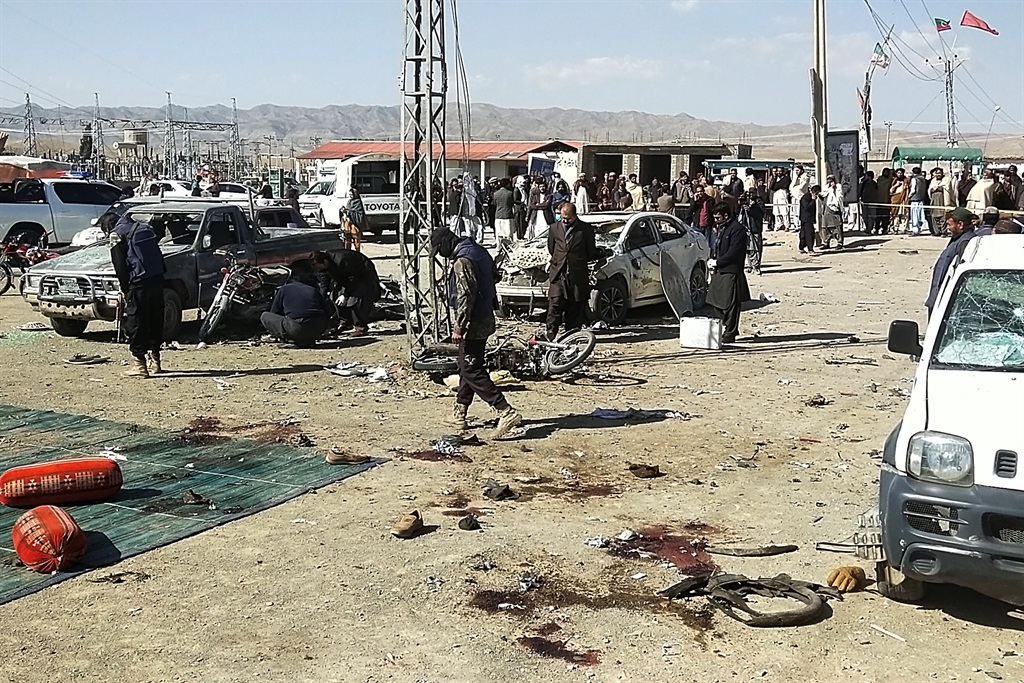Pakistan Twin Bombings Before Elections Killed At Least 26 People
In a devastating turn of events, Pakistan twin bombings before elections, claiming the lives of 26 individuals and leaving scores wounded near electoral candidates' offices on Wednesday. The tragic incident has heightened security apprehensions on the eve of the general election scheduled for Thursday.
Author:Suleman ShahReviewer:Han JuFeb 08, 202454.7K Shares829.1K Views

In a devastating turn of events, Pakistan twin bombings before elections, claiming the lives of 26 individuals and leaving scores wounded near electoral candidates' offices on Wednesday. The tragic incident has heightened security apprehensions on the eve of the general election scheduled for Thursday.
As Pakistan braces for the polls amidst escalating militant attacks, the nation remains gripped by the incarceration of Imran Khan, the erstwhile victor of the preceding national election. Despite grappling with an economic crisis and various challenges, the nuclear-armed country finds itself at a critical juncture, with the spotlight fixed on the unfolding electoral scenario.
Pakistan Bombed Twice During Election Preparations

In a tragic prelude to Pakistan's imminent parliamentary election, two separate explosions targeted political offices in the southwestern province of Baluchistan on Wednesday, claiming the lives of at least 26 individuals and leaving numerous otherswounded, according to officials.
The assaults, occurring just a day before the crucial polls, have raised alarm bells in the restive region, already grappling with a persistent low-level insurgency and the presence of various militant groups.
The first attack struck the election office of independent candidate Asfandyar Khan in the Pashin district, resulting in the death of at least 18 people, as reported by Jumadad Mandokhel, a government official.
Shortly after, another blast rocked the Jamiat Ulema Islam party office in Qilla Saifullah, located approximately 130 kilometers away, claiming the lives of at least 12 individuals. Jan Achakzai, the spokesperson for the provincial government, confirmed that despite the bombings, the elections would proceed as scheduled.
The Islamic State group's branch in Pakistan claimed responsibility for the second attack, heightening concerns over the security landscape in the region. This wave of violence follows a surge in attacks, prompting the deployment of tens of thousands of police and paramilitary forces across the country, particularly in Baluchistan.
Expressing condemnation, various political parties denounced the attacks. Despite the grim situation, officials emphasized that the elections would not be delayed. Meanwhile, in Karachi, a separate incident unfolded as a man prematurely detonated a hand grenade, resulting in his death and the tragic loss of two bystanders.
The Jamiat Ulema Islam party, known for its close ties with Afghanistan's Taliban, has been a target for the Islamic State group and other militants in recent years. Baluchistan, a province rich in gas resources, has witnessed a prolonged insurgency by Baluch nationalists seeking independence. While the nationalists typically target security forces, recent incidents highlight a shift towards civilian and political targets.
As the nation braces for election day, concerns persist regarding the potential for further violence. Analysts, including Abdullah Khan from the Pakistan Institute for Conflict and Security Studies, suggest multiple groups, such as splinter factions within the Pakistani Taliban, Islamic State, Baluch nationalists, or al-Qaida, could be behind the recent bombings.
Caretaker Prime Minister Anwaarul-Haq-Kakar condemned the attacks, assuring that every effort would be made to maintain law and order during the elections. Despite a three-day mourning period announced by the provincial government, officials reiterated the commitment to hold the elections on Thursday, urging citizens to exercise their right to vote and thwart those attempting to disrupt the democratic process.
The haunting specter of violence during elections in Pakistan resurfaces, reminiscent of the tragic 2007 attack that claimed the lifeof two-time Prime Minister Benazir Bhutto. The country remains on high alert, with security concerns looming large as the nation prepares to cast its ballots.
Conclusion
As the pall of tragedy hangs heavy over Pakistan, a grim prelude to the impending parliamentary elections unfolded with two bombings targeting the election offices of a political party and an independent candidate. The devastation, which claimed the lives of at least 26 individuals and left more than two dozen others wounded, casts a somber shadow on the eve of the crucial polls.

Suleman Shah
Author
Suleman Shah is a researcher and freelance writer. As a researcher, he has worked with MNS University of Agriculture, Multan (Pakistan) and Texas A & M University (USA). He regularly writes science articles and blogs for science news website immersse.com and open access publishers OA Publishing London and Scientific Times. He loves to keep himself updated on scientific developments and convert these developments into everyday language to update the readers about the developments in the scientific era. His primary research focus is Plant sciences, and he contributed to this field by publishing his research in scientific journals and presenting his work at many Conferences.
Shah graduated from the University of Agriculture Faisalabad (Pakistan) and started his professional carrier with Jaffer Agro Services and later with the Agriculture Department of the Government of Pakistan. His research interest compelled and attracted him to proceed with his carrier in Plant sciences research. So, he started his Ph.D. in Soil Science at MNS University of Agriculture Multan (Pakistan). Later, he started working as a visiting scholar with Texas A&M University (USA).
Shah’s experience with big Open Excess publishers like Springers, Frontiers, MDPI, etc., testified to his belief in Open Access as a barrier-removing mechanism between researchers and the readers of their research. Shah believes that Open Access is revolutionizing the publication process and benefitting research in all fields.

Han Ju
Reviewer
Hello! I'm Han Ju, the heart behind World Wide Journals. My life is a unique tapestry woven from the threads of news, spirituality, and science, enriched by melodies from my guitar. Raised amidst tales of the ancient and the arcane, I developed a keen eye for the stories that truly matter. Through my work, I seek to bridge the seen with the unseen, marrying the rigor of science with the depth of spirituality.
Each article at World Wide Journals is a piece of this ongoing quest, blending analysis with personal reflection. Whether exploring quantum frontiers or strumming chords under the stars, my aim is to inspire and provoke thought, inviting you into a world where every discovery is a note in the grand symphony of existence.
Welcome aboard this journey of insight and exploration, where curiosity leads and music guides.
Latest Articles
Popular Articles